- Home
- Sarah MacLean
Brazen and the Beast
Brazen and the Beast Read online
Dedication
For V.
You’re my favorite thing.
Contents
Cover
Stepback
Title Page
Dedication
Chapter One
Chapter Two
Chapter Three
Chapter Four
Chapter Five
Chapter Six
Chapter Seven
Chapter Eight
Chapter Nine
Chapter Ten
Chapter Eleven
Chapter Twelve
Chapter Thirteen
Chapter Fourteen
Chapter Fifteen
Chapter Sixteen
Chapter Seventeen
Chapter Eighteen
Chapter Nineteen
Chapter Twenty
Chapter Twenty-One
Chapter Twenty-Two
Chapter Twenty-Three
Chapter Twenty-Four
Chapter Twenty-Five
Chapter Twenty-Six
Epilogue
Acknowledgments
An Excerpt from Daring and the Duke Daring and the Duke
About the Author
Also by Sarah MacLean
Copyright
About the Publisher
Chapter One
September 1837
Mayfair
In twenty-eight years and three hundred and sixty-four days, Lady Henrietta Sedley liked to think that she’d learned a few things.
She’d learned, for example, that if a lady could not get away with wearing trousers (an unfortunate reality for the daughter of an earl, even one who had begun life without title or fortune), then she should absolutely ensure that her skirts included pockets. A woman never knew when she might require a bit of rope, or a knife to cut it.
She’d also learned that any decent escape from her Mayfair home required the cover of darkness and a carriage driven by an ally. Coachmen tended to talk a fine game when it came to keeping secrets, but they were ultimately beholden to those who paid their salaries. An important addendum to that particular lesson was this: The best of allies was often the best of friends.
And perhaps first on the list of things she had learned in her lifetime was how to tie a Carrick bend knot. She’d been able to do that for as long as she could remember.
With such an obscure and uncommon collection of knowledge, one might imagine that Henrietta Sedley would have known precisely what to do in the likelihood she discovered a human male bound and unconscious in her carriage.
One would be incorrect.
In point of fact, Henrietta Sedley would never have described such a scenario as a likelihood. True, she might have been more comfortable on London’s docks than in its ballrooms, but Hattie’s impressive collection of life experience lacked anything close to a criminal element.
And yet, here she was, pockets full, dearest friend at her side, standing in the pitch dark on the night before her twenty-ninth birthday, about to steal away from Mayfair for an evening of best-laid plans, and . . .
Lady Eleanora Madewell whistled, low and unladylike, at Hattie’s ear. Daughter of a duke and the Irish actress he loved so well that he’d made her a duchess, Nora had the kind of brashness that was allowed in those with impervious titles and scads of money. “There’s a bloke in the gig, Hattie.”
Hattie did not look away from the bloke in question. “Yes, I see that.”
“There wasn’t a bloke in the gig when we hitched the horses.”
“No, there wasn’t.” They’d left the hitched—and most definitely empty—carriage in the dark rear drive of Sedley House not three quarters of an hour earlier, before hiking upstairs to exchange carriage-hitching dresses for attire more appropriate for their evening plans.
At some point between corset and kohl, someone had left her an extraordinarily unwelcome package.
“Seems we would’ve noticed a bloke in the gig,” Nora said.
“I should think we would have,” came Hattie’s distracted reply. “This is really just awful timing.”
Nora cut her a look. “Is there a good time to find a man bound and unconscious in one’s carriage?”
Hattie imagined there wasn’t, but, “He could have selected a different evening. This is a terrible birthday gift.” She squinted into the dark interior of the carriage. “Do you think he’s dead?”
Please, don’t let him be dead.
Silence. Then, a thoughtful, “Does one store dead men in carriages?” Nora reached forward, her coachman’s coat pulling tight over her shoulders, and poked the possibly dead man in question. He did not move. “He’s not moving,” she added with an unhelpful shrug. “Could be dead.”
Hattie sighed, removing a glove and leaning into the carriage to place two fingers to the man’s neck. “I’m sure he’s not dead.”
“What are you doing?” Nora whispered urgently. “If he’s not, you’ll wake him!”
“That wouldn’t be the worst thing in the world,” Hattie pointed out. “Then we could ask him to kindly exit our conveyance and we could be on our way.”
“Oh, yes. This brute seems like precisely the kind of man who would immediately do just that and not immediately take his revenge. He’d no doubt doff his cap and wish us a fine good evening.”
“He’s not wearing a cap,” Hattie said, unable to refute any of the rest of the assessment of the mysterious, likely dead man. He was very broad, and very solid, and even in the darkness she could tell that this wasn’t a man with whom one took a turn about a ballroom.
This was the kind of man who ransacked a ballroom.
“What do you feel?” Nora pressed.
“No pulse.” Though she wasn’t exactly sure where one would find a pulse. “But he’s—”
Warm.
Dead men were not warm, and this man was very warm. Like a fire in winter. The kind of warm that made someone realize how cold she might be.
Ignoring the silly thought, Hattie moved her fingers down the column of his neck, to the place where it disappeared beneath the collar of his shirt, where the ridge of his shoulder and the slope of . . . the rest of him . . . met in a fascinating indentation.
“Anything now?”
“Quiet.” Hattie held her breath. Nothing. She shook her head.
“Christ.” It wasn’t a prayer.
Hattie couldn’t have agreed more. But then . . .
There. A small flutter. She pressed a touch more firmly. The flutter became steady. Slow. Even. “I feel it,” she said. “He’s alive.” She repeated herself. “He’s alive.” She exhaled, long and relieved. “He’s not dead.”
“Excellent. But it doesn’t change the fact that he’s unconscious in the carriage, and you have somewhere to be.” Nora paused. “We should leave him and take the curricle.”
Hattie had been planning for this particular excursion on this particular night for a full three months. This was the night that would begin her twenty-ninth year. The year her life would become her own. The year she would become her own. And she had a very specific plan for a very specific location at a very specific hour, for which she had donned a very specific frock. And yet, as she stared at the man in her carriage, specifics seemed not at all important.
What seemed important was seeing his face.
Clinging to the handle at the edge of the door, Hattie collected the lantern from the upper rear corner of the carriage before swinging back out to face Nora, whose gaze flickered immediately to the unlit container.
Nora tilted her head. “Hattie. Leave him. We’ll take the curricle.”
“Just a peek,” Hattie replied.
The tilt became a slow shake. “If you peek, you’ll regret it.”
“I hav
e to peek,” Hattie insisted, casting about for a decent reason—ignoring the odd fact that she was unable to tell her friend the truth. “I have to untie him.”
“Not necessarily,” Nora pointed out. “Someone thought he was best left tied up, and who are we to disagree?” Hattie was already reaching into the pocket of the carriage door for a flint. “What of your plans?”
There was plenty of time for her plans. “Just a peek,” she repeated, the oil in the lantern catching fire. She closed the door and turned to face the carriage, lifting the light high, casting a lovely golden glow over—
“Oh, my.”
Nora choked back a laugh. “Not such a bad gift after all, it seems.”
The man had the most beautiful face Hattie had ever seen. The most beautiful face anyone had ever seen. She leaned closer, taking in his warm, bronze skin, the high cheekbones, the long, straight nose, the dark slashes of his brows, and the impossibly long lashes that lay like sin against his cheeks.
“What kind of man . . .” She trailed off. Shook her head.
What kind of man looked like this?
What kind of man looked like this and somehow landed in the carriage of Hattie Sedley—a woman who was very unused to being in the vicinity of men who looked like this.
“You’re embarrassing yourself,” Nora said. “You’re staring and your jaw has gone fully slack.”
Hattie closed her mouth, but did not stop staring.
“Hattie. We have to go.” A pause. Then, “Unless you’ve changed your mind?”
The casual question brought Hattie back to the moment. To her plan. She shook her head. Lowered the lantern. “I haven’t.”
Nora sighed and placed her hands on her hips, staring past Hattie into the carriage. “You get his bottom, and I’ll take his top, then?” She looked to a shadowed alcove behind her. “He can resume consciousness there.”
Hattie’s heart pounded. “We can’t leave him here.”
“We can’t?”
“No.”
Nora slid her a look. “Hattie. We can’t take him with us just because he looks like a Roman statue.”
Hattie blushed in the darkness. “I hadn’t noticed.”
“You lost the power of speech.”
She cleared her throat. “We can’t take him because Augie left him here.”
Nora’s lips flattened into a perfect, straight line. “You don’t know that.”
“I know,” Hattie said, holding the lantern near the rope at the man’s wrists, and sweeping it down to the place where he was bound at the ankles, “because August Sedley can’t tie a Carrick bend worth a damn, and I fear that if we leave this man here, he’ll find his way loose and head straight for my useless brother.”
That, and if the stranger didn’t find his way loose, who knew what Augie would do to him. Her brother was as cabbageheaded as he was reckless—a combination that routinely required Hattie’s intervention. Which, incidentally, was a significant reason for her decision to claim her twenty-ninth year as her own. And still, here her infernal brother was, ruining everything.
Unaware of Hattie’s thoughts, Nora said, “Recently unconscious or no . . . this doesn’t look like a man who loses in a fight.”
The understatement was not lost on Hattie. She sighed, reaching in and hanging the now glowing lantern on its peg, taking the opportunity to cast a long, lingering look at the man in her carriage.
Hattie Sedley had learned something else in her twenty-eight years, three hundred and sixty-four days: If a woman had a problem, it was best she solve it herself.
She pulled herself up into the carriage, stepping carefully over the man on the floor before looking back at wide-eyed Nora on the drive below. “Come on, then. We’ll drop him on our way.”
Chapter Two
The last thing he remembered was the blow to the head.
He’d been expecting the ambush. It was why he’d been driving the rig, six fine horses pulling a massive steel conveyance laden with liquor and playing cards and tobacco, destined for Mayfair. He’d just crossed Oxford Street when he’d heard the gunshot, followed by a pained cry from one of his outriders.
He’d stopped to check on his men. To protect them.
To punish those who threatened them.
There’d been a body on the ground. Blood on the street beneath it. He had just sent the second outrider for help when he heard the footsteps at his back. He’d turned, knife in hand. Thrown it. Heard the shout in the darkness as it found its seat.
Then the blow to the head.
And then . . . nothing.
Not until an insistent tapping against his cheek returned him to consciousness, too soft for pain, still firm enough to be irritating.
He didn’t open his eyes, years of training allowing him to feign sleep as he gathered his bearings. His feet were bound. Hands, too, behind his back. The bindings stretched the muscles of his chest tight enough for him to take note of what was missing—his knives, eight steel blades, set in onyx. Stolen along with the brace that strapped them to his chest. He resisted the urge to stiffen. To rage.
But Saviour Whittington, known in London’s darkest streets as Beast, did not rage; he punished. Quick and devastating and without emotion.
And if they’d taken the life of one of his men—of someone under his protection—they would never know peace.
But first, freedom.
He was on the floor of a moving carriage. A well-appointed one, if the soft cushion at his cheek was any indication, and in a decent neighborhood for the smooth rhythm of the cobblestones beneath the wheels.
What was the time?
He considered his next move—envisioning how he would incapacitate his captor despite his bindings. He imagined breaking a nose with the flat weapon of his forehead. Using his bound legs to knock the man out.
The tapping at his cheek began again. Then a whispered, “Sir.”
Whit’s eyes flew open.
His captor wasn’t a man.
The wash of golden light in the carriage played tricks with him—seeming to come somehow not from the lantern swaying gently in the corner, but from the woman.
Seated on the bench above him, she looked nothing like the kind of enemy who would knock a man out and tie him up in a carriage. Indeed, she looked like she was on her way to a ball. Perfectly done, perfectly coiffed, perfectly colored—her skin smooth, her eyes kohled, her lips full and stained just enough to make a man pay attention. And that was before he got a look at the dress—blue the color of a summer sky, perfectly fitted to her full figure.
Not that he should be noticing anything about that, considering she had him tied up in a carriage. He shouldn’t be noticing the curves of her, soft and welcoming at her waist, at the line of her bodice. He shouldn’t be noticing the gleam of the smooth, golden skin at her rounded shoulder in the lantern light. He shouldn’t be noticing the pretty softness of her face, or the fullness of her lips, stained red with paint.
She wasn’t for noticing.
He narrowed his gaze on her, and her eyes—was it possible they were violet? What kind of a person had violet eyes?—went wide. “Well. If that look is any indication of your temperament, it’s no wonder you are tied up.” She tilted her head. “Who tied you up?”
Whit did not reply. He did not believe she didn’t know the answer.
“Why are you tied up?”
Again, silence.
Her lips flattened into a straight line and muttered something that sounded like “Useless.” And then, louder, firmer, “The point is, you’re very inconvenient, as I have need of this carriage tonight.”
“Inconvenient.” He didn’t mean to reply, and the word surprised them both.
She nodded. “Indeed. It’s the Year of Hattie.”
“The what?”
She waved a hand, as though to push the question away. As though it weren’t important. Except Whit imagined it was. She pressed on. “It is my birthday. I have plans for myself. Plans that don’t inc
lude . . . whatever this is.” Silence stretched between them, then, “Most people would wish me a happy birthday at this juncture.”
Whit did not rise to the bait.
Her brows rose. “And here I was, ready to help you.”
“I don’t need your help.”
“You’re quite rude, you know.”
He resisted the unwelcome instinct to gape. “I’ve been knocked out and tied up in a strange carriage.”
“Yes, but you must admit the company is diverting, no?” She smiled, the dimple flashing in her right cheek impossible to ignore.
When he did not reply, she said, “Fine then. But it strikes me that you’re in a bind, sir.” She paused, then added, “You see how diverting I can be? In a bind?”
He worked at the ropes at his wrists. Tight, but already giving. Escapable. “I see how reckless you can be.”
“Some find me charming.”
“I do not find things charming,” he replied, continuing to manipulate the ropes, wondering what possessed him to spar with this chatterbox.
“That’s a pity.” It sounded like she meant it, but before he could think of what to say, she added, “No matter. Even if you won’t admit it, you do need help and, as you are bound and I am your travel companion, I’m afraid you are stuck with me.” She crouched by his feet, as though it were all perfectly ordinary, untying the ropes with a soft, deft touch. “You’re lucky I am quite good with knots.”
He grunted his approval, stretching his legs in the confined space when she set him free. “And that you have other plans for your birthday.”
She hesitated, her cheeks pinkening at the words. “Yes.”
Whit would never understand what made him press further. “What plans?”
Her ridiculous eyes, an impossible color and too big for her face, shuttered. “Plans that for once don’t involve cleaning up whatever mess you are.”
“Next time I am clubbed unconscious, I shall endeavor to do it where I shan’t be in your way, my lady.”
She grinned, that dimple flashing like a private jest. “See that you do.” Before he could reply, she said, “Though I suppose it won’t be an issue in the future. We clearly don’t run in the same circles.”

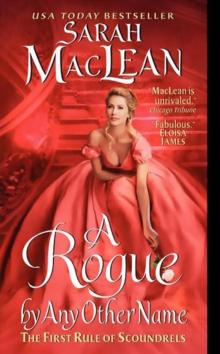 A Rogue by Any Other Name
A Rogue by Any Other Name One Good Earl Deserves a Lover
One Good Earl Deserves a Lover Ten Ways to Be Adored When Landing a Lord
Ten Ways to Be Adored When Landing a Lord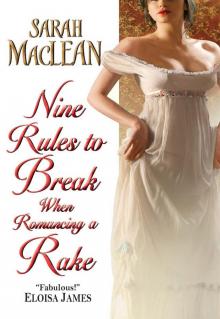 Nine Rules to Break When Romancing a Rake
Nine Rules to Break When Romancing a Rake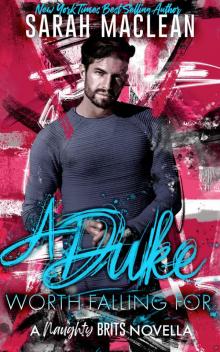 A Duke Worth Falling For
A Duke Worth Falling For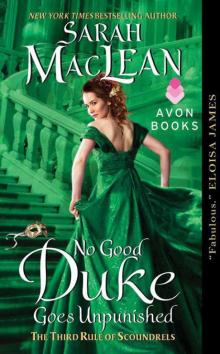 No Good Duke Goes Unpunished
No Good Duke Goes Unpunished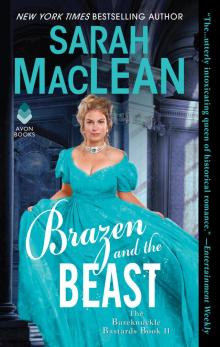 Brazen and the Beast
Brazen and the Beast Never Judge a Lady by Her Cover
Never Judge a Lady by Her Cover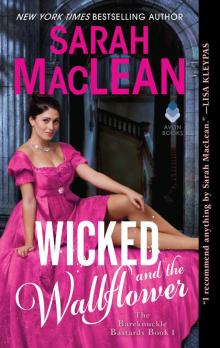 Wicked and the Wallflower
Wicked and the Wallflower The Rogue Not Taken
The Rogue Not Taken Bombshell
Bombshell A Scot in the Dark
A Scot in the Dark Eleven Scandals to Start to Win a Duke's Heart
Eleven Scandals to Start to Win a Duke's Heart Naughty Brits: An Anthology
Naughty Brits: An Anthology The Day of the Duchess
The Day of the Duchess Never Judge a Lady By Her Cover: Number 4 in series (The Rules of Scoundrels series)
Never Judge a Lady By Her Cover: Number 4 in series (The Rules of Scoundrels series)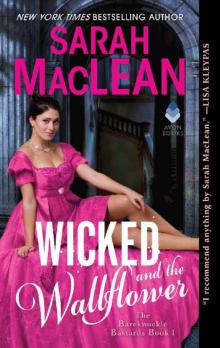 Wicked and the Wallflower: Bareknuckle Bastards Book 1
Wicked and the Wallflower: Bareknuckle Bastards Book 1 Never Judge a Lady by Her Cover_The Fourth Rule of Scoundrels
Never Judge a Lady by Her Cover_The Fourth Rule of Scoundrels